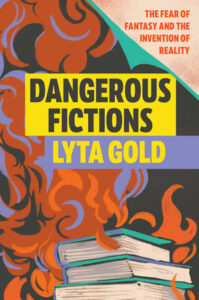Lyta Gold
Lyta Gold is a critic, essayist, and fiction writer living in Queens. Her work has appeared in The Baffler, Protean, the New York Review of Architecture, and Current Affairs.
Subscribe to our newsletter for news & events from Soft Skull Press.
Books
Dangerous Fictions
The Fear of Fantasy and the Invention of Reality
Honorable Mention for the Pop Culture Association AwardsIn a political moment when social panics over literature are at their peak, Dangerous Fictions is a mind-expanding treatise on the nature of fictional stories as cultural battlegrounds for power.
Fictional stories have long held an uncanny power over hearts and minds, especially those of young people. In Dangerous Fictions, Lyta Gold traces arguments both historical and contemporary that have labeled fiction as dark, immoral, frightening, or poisonous. Within each she asks: How “dangerous” is fiction, really? And what about it provokes waves of moral panic and even censorship?
Gold argues that any panic about art is largely a disguised panic about power. There have been versions of these same fights over fiction for centuries. By exposing fiction as a social danger and a battleground of immediate public concern, we can see what each side really wants—the right to shape the future of a world deeply in flux and a distraction from more pressing material concerns about money, access, and the hard work of politics.
From novels about people driven insane by reading novels to “copaganda” TV shows that influence how viewers regard the police, Gold uses her signature wit, research, and fearless commentary to point readers toward a more substantial question: Fiction may be dangerous to us, but aren’t we also dangerous to it?
Catapult | Counterpoint | Soft Skull
20 Jay Street #704
Brooklyn, NY 11201
646.926.0805 | contact@catapult.co
20 Jay Street #704
Brooklyn, NY 11201
646.926.0805 | contact@catapult.co





